Interest-Free Banking and Finance Conferences
Uploaded on June 11, 2015
Case for interest-free banking and finance
By K C Tyagi
In an open letter addressed to the citizens of the country published on 26th May 2015, i.e., on the occasion of completing one year of the Union government, the Prime Minister stated that government was dedicated to the poor, marginalised and those left behind. Sabka sath Sabka vikas, the slogan extensively used in BJP campaign, also conveyed the same idea. The Pradhan Mantri Jan Dhan Yojna was also aimed at financial inclusion of the most deprived sections of the society.
The State Bank of India Shariah-compliant Mutual Fund, that was cleared by all agencies for launch on December 1, 2014 was suddenly deferred on November 30, 2014, hours before the scheduled launch. There is no clear-cut, above board explanation for this decision. In that case, the only obvious reason seems to be the government’s antipathy for the word Shariah.
This move of the government militates against its avowed commitment to inclusion and a sense of fellowship of citizens. A sizeable section of Muslims avoids investment in interest-related funds because interest is seen by them as unethical and exploitative. For people like them an interest-free system is a great attraction.
That such a mutual fund is going to benefit everyone is clear. Pious Muslims, including NRIs, particularly those in the Gulf region, stay away from finance and banking transactions mainly because of their aversion to interest. With the availability of such a system the country’s finance and banking system will benefit from surplus funds with such NRIs and it will become more inclusive.
The report of the committee on financial sector reforms, headed by the current RBI Governor Raghuram Rajan, in its report in 2012 recommended interest-free banking being “in consonance with the objectives of inclusion and growth through innovation.”
Delhi-based Institute of Objective Studies, which has conducted several studies, seminars and symposia with international participation on the subject has explained to the government and bank authorities that they would not insist on the nomenclature “Shariah”, and would welcome any name like Ethical Investment, Participatory Banking, Alternative Banking etc. In fact, interest-free banking is operational in UK, France, Singapore, Brazil and the Middle East. Some of the world’s largest banks have special counters for such operations in major Western countries. Even China is promoting it. The operational term in many cases is not “Shariah”, but “interest-free”. As many as 75 countries across the world have adopted the system.
Interest-free banking is interest-free banking and its proponents do not insist on a particular nomenclature. The SBI had announced the scheme after completing due diligence about feasibility, legal-technical and regulatory issues. That’s why the sudden deferral of the decision has been intriguing.
Interestingly, a substantial chunk of people investing in such schemes are non-Muslims. An important attraction of such funds is that their backers discourage speculation, manipulation of value of assets and making tall promises about the value of products. Because of this it is less prone to fluctuating markets than traditional funds. The prospect of interest-free transactions attracts a certain class of investors, most of whom are Muslims. This is the secret behind UTI Unit 64 and others’ popularity among Muslims. However, this does not deter non-Muslims from participation as Tata Ethical Fund and Taurus Equity Fund support shows. In the latter, there are 40 percent Jains.
It is important to note that most farmers’ suicides have their inability to repay their loans behind the gruesome act. As crop fail and interest on the loan taken for buying farm inputs mounts, the cornered farmers have no option but to kill themselves, leaving behind destitute widows and orphaned children who inherit such liabilities.
The scientist MS Swaminathan, who played a crucial role ushering in India’s Green Revolution, has endorsed this concept as a solution for rising farmer’s suicides in the country.
Finding the deferral of the SBI mutual fund at the last moment intriguing, I wrote to the Finance Minister on March 12 to know the cause of such a last-moment decision. On May 19, Union Minister of State for Finance, Jayant Sinha, wrote back to me that it was deferred because of “operational constraints arising out of the inputs received from various participants in the pre-launch meeting”.
It will be of some help if the Finance Ministry lets us know as to who were the “participants” and what were the “inputs” they provided. What type of constraints arose from those inputs, and why the SBIFMPL had not rectified those constraints and relaunched the scheme within the stipulated time (January 25, 2015).
Meanwhile, the Islamic banking assets with commercial banks worldwide are estimated to be around US$ 1.8 trillion and it happens to be growing at a faster rate than traditional banking in Qatar, Saudi Arabia, Malaysia, Indonesia and Turkey. This reckoning does not include Iran.
With these facts and figures in view, we will do well to allow the system in India as its will help both the investors and economy as a whole. Continuation of the deferral is arbitrary and unfair. This is particularly so in view of Dr. Swaminathan’s remarks. According to P. Sainath, a respected journalist specialising in rural development and farm economy, about 300,000 farmers have committed suicide in India since 1995.
“Most farm suicides have been linked to debt, a sharp rise in input costs, serious water crises, price volatility and crop failure due to pest-attacks and diseases”, says Sainath. Whatever the reason behind crop failure, the interest goes on accumulating leading to desperation and suicide. Hence, the beginning of an interest-free system will of immensely help in this regard.
(The author is Member of Parliament {Rajya Sabha})
Uploaded on March 23, 2015
Time for review of decision on mutual fund
Dr. Mohammad Manzoor Alam
It is time now for the Union government to have a fresh look at its decision to defer a Shariah-compliant mutual fund by the State Bank of India.
The SBI had decided to launch it in December 2014 after due consultation with and permission from the Reserve Bank of India and the Union government.
At the last moment, the decision was deferred by the new government. As it was not cancelled right away, we have reason to hope that the government would have a fresh look at the decision.
We feel that the moment for allowing it has arrived. It will certainly help the inclusion of Muslims in the country’s financial system. Pious Muslims stay away from interest-based transactions as they feel this system is unethical and exploitative.
The inclusion of so many people in the financial system will only boost the national economy in the long run, which should be a legitimate reason for any government to allow it. Because it makes sound financial sense the world’s best banks have special windows for such transactions.
On enquiry we found that the system is not comfortable with such products and instruments because of their nomenclature. Prefixes like “Islamic” or “Shariah” are said to cause reservations among decision makers on the issue.
We offer to have the mutual fund under any nomenclature like “equitable”, “ethical”, or any other such name.
We hope that we will get a fresh opportunity to benefit from the SBI programme stalled before it could take off. This is time for government to review it.
Uploaded on December 1, 2014
Some Progress at Last
Dr. Mohammad Manzoor Alam
After years of effort the struggle for having a full-fledged Islamic banking system in India met with a moderate measure of success when the State Bank of India announced last week that it would launch a Shariah-compliant mutual fund in December.
It is for the first time that a state-owned bank is to start an Islamic financial instrument in India. The SBI has got both the Reserve Bank of India’s and the government’s permission for it. Happily, Muslim leaders have already welcomed it.
Although Shariah-compliant investments are already doing well in India, SBI’s move is the first such step coming from a state-owned bank. In 2013, the Bombay Stock Exchange launched its first Shariah Index, but IOS had launched possibly the first Shariah-compliant Index in 2008 in collaboration with financial consultants Eastwind.
This is not enough for proper Islamic banking in India, but an inclusionary move for non-interest financial operations. Islam does not approve of interest taking or paying. Scholars associated with IOS have written hundreds of well-researched articles and dozens of books arguing for interest-free banking and financial operations.
The IOS, in collaboration with Indo-Arab Economic Cooperation Forum, organised a two-day conference at Vigyan Bhavan, New Delhi, where leading bankers and fund managers from other countries came together. Besides, Indian and foreign government leaders interacted. Then Prime Minister of India, Mr. Manmohan Singh, visited to chat with the guests.
At the two-day international conference on “Indo-Arab Relations: Partnership in Development” these issues were part of the agenda. The then Finance Minister of India, P. Chidambram, and senior government officials participated in the proceedings.
At the IOS-organised two-day international conference on “Participatory Banking for All: A Business Proposition” stalwarts like Vice-President Hamid Ansari; then Deputy Chairman Rajya Sabha K. Rahman Khan; former Chief Justice of India AM Ahmadi; former Malaysian Deputy Prime Minister Anwar Ibrahim; MBN Rao, Chairman Indian Banks Association, and other dignitaries and bankers from India and abroad participated. The conference was inaugurated by the Union Finance Minsiter P. Chidambram.
Similar conferences were organised over the years in New Delhi on June 14, 2008 (“Move Towards Ethical Investment in India”) jointly by IOS and Indo-Arab Economic Cooperation Forum; in New Delhi again, on February 3-4, 2010 (“Beyond the Meltdown: Search for Options”) jointly by IOS and Indo-Arab Economic Cooperation Forum, and in Kashmir University, Srinagar (“Interest-Free Institutional Mechanism [Banking, Finance and Insurace] for Promoting Investment”) organised jointly by IOS and Department of Business and Finance Studies, Kashmir University from June 3 to 5, 2011.
The goal has not been achieved fully, but only in part. There is more struggle ahead.
Light at end of tunnel, finally
Dr Mohammad Manzoor Alam on the new development towards Islamic banking in India
The Reserve Bank Governor Mr D. Subba Rao’s recent announcement constitutes a significant advance in the field of Islamic banking and finance in India, which has been a cherished goal for all of us, and for the attainment of which the Institute of Objective Studies has worked tirelessly over the last quarter century.
Although in Islamic finance we have already made substantial advance in India in terms of growing acceptance of Shariah-compliant investments and other Shariah-compliant financial services and products. The IOS, with the collaboration of financial consultants Estwind, developed a Shariah index of thousands of companies in India, which has helped pious Muslim investors to invest safely.
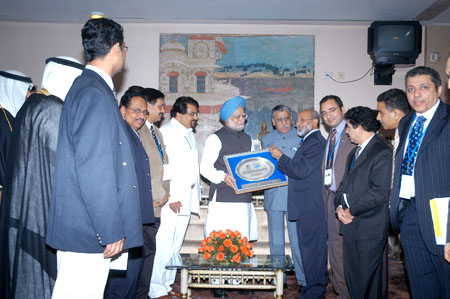
A high level Indo-Arab delegation visited to Hon’ble Dr Manmohan Singh, Prime Minister of India at Vigyan Bhavan, New Delhi on November 13, 2006 Dr M. Manzoor Alam, President Indo-Arab Co-operation Forum and Chairman Institute of Objective Studies presents a memento to Hon’ble Prime Minister of India
However, Islamic banking itself has been a far more tougher nut to crack. Finally, it has begun to crack and we hope to have a proper Islamic banking system in India, which so far had no such institution. Despite a huge body of research carried out by the IOS, and a large number of books published by us, introducing a large number of issues of Islamic economics to the wider society, the scene did not seem to change even a wee bit.
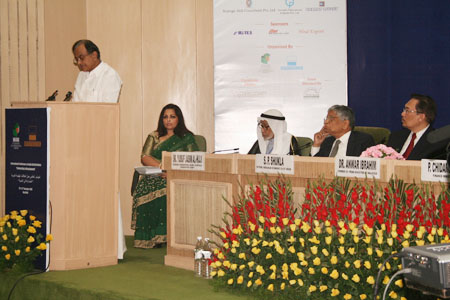
A view of Two-day International Conference on "Indo-Arab Relations: Partnership in Development" at Vigyan Bhavan, New Delhi on November 13-14, 2006 Organised by Institute of Objective Studies and Indo-Arab Economic Co-operation Forum
L-R: Hon’ble Mr P. Chidambaram, Union Finance Minister of India (speaker); Hon’ble Shaikh Yusuf Jasim Al-Hijji, President International Islamic Charitable Organisation, Kuwait; Mr. S.P Shukla, Former Finance & Commerce Secretary, Govt. of India; Hon’ble Dr. Anwar Ibrahim, Former Deputy Prime Minister of Malaysia
After writing hundreds of articles by scholars associated with the IOS, long debates, including an hour-long discussion on India’s premier TV network on prime time by Prof. Omar Chapra, Prof. Ausaf Ahmad and me on the advantages of interest-free banking and financial mechanisms nothing seemed to have changed. This programme was organized by IOS with great effort.
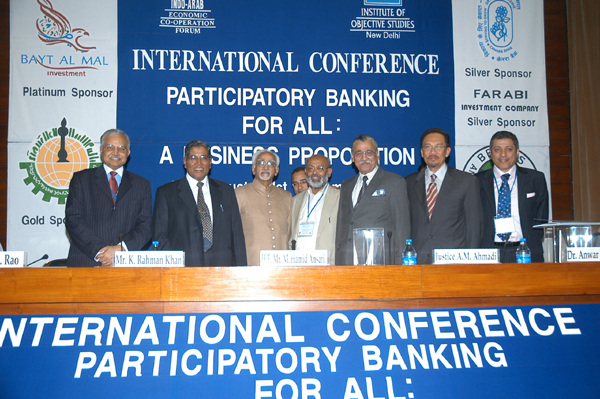
A view of Two-day International Conference on Participatory Banking for All: A Business Proposition at Parliament House Annexe, New Delhi on August 31 & September 1, 2007 Organised by Institute of Objective Studies and Indo-Arab Economic Co-operation Forum
L-R: Mr M.B.N. Rao, Chairman Indian Banks Association; Mr K. Rehman Khan, Deputy Chairman Rajya Sabha; Shri M. Hamid Ansari, Vice President of India;
Dr M. Manzoor Alam, President Indo-Arab Co-operetion Forum and Chairman IOS; Hon'ble Justice A.M. Ahmadi, Former Chief Justice of India; Hon’ble Dr. Anwar Ibrahim, Former Deputy Prime Minister of Malaysia; Mr Sulaiman A. Al-Qimlas, Chairman Bayat al-Mal Investment Organisation of Kuwait
After years of long consultations with financial experts, seminars by erudite scholars, highest officials of Reserve Bank of India, Securities and Exchange Board of India, besides government secretaries in the ministries of finance, trade and commerce, and law we could come to the conclusion that unless India’s banking laws are suitably amended the Reserve Bank of India cannot allow Islamic banking operations in India.
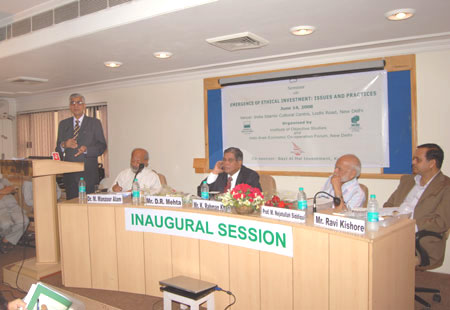
A view of MOVE TOWARDS ETHICAL INVESTMENT IN INDIA (June 14, 2008) at New Delhi Organised by Institute of Objective Studies and Indo-Arab Economic Co-operation Forum
L-R: (Speaker) Mr D. R. Mehta, Former chairman of Security & Exchange Board of India (SEBI); Dr Mohd. Manzoor Alam, President Indo-Arab Co-operetion Forum and Chairman IOS; Mr K. Rehman Khan, Deputy Chairman Rajya Sabha; Dr Mohammad Nejatullah Siddiqi, Islamic Economist; Mr. Ravi Kishore, Secretary General Indo-Arab Co-operetion Forum
For the last eight to ten years, the IOS, often with Indo-Arab Economic Co-operation Forum, has run a massive campaign of public awareness of the non-exploitative and stable nature of Islamic banking and finance as well as lobbying with the political elite to convince them about the desirability of introducing Islamic banking in India.

A view of launching of India Islamic Index (June 25, 2008) at New Delhi Organised by Institute of Objective Studies, Indo-Arab Economic Co-operation Forum & Eastwind Capital Advisors Pvt. Ltd.
L-R (Sitting on the dice): Mr. Mohd. Ali Ashraf Fatmi, Hon'ble Minister of State for HRD; Hon'ble Justice A.M. Ahmadi; Smt. Sheila Dikshit, Hon'ble Chief Minister of Delhi launching the India Islamic Index
L-R (Standing) Mr. Ravi Kishore, Secretary General Indo-Arab Co-operetion Forum; Dr.Mohd. Manzoor Alam, President Indo-Arab Co-operetion Forum; Mr. Shailendra Kumar CEO Eastwind Capital Advisor Pvt. Ltd.; Mr. Krishna N.Narnolia President Eastwind Capital Advisor Pvt. Ltd. (extremely right)
Our deliberations over the issues have been graced by the Prime Minister, Finance Minister, Home Minister and eight to ten ministers of the Union Cabinet, besides Chief Ministers of Delhi state and other states at a time. At one of these conferences, the Prime Minister met Arab delegates and also invited them for a longer talk over tea to his residence in the evening.
After all these years of struggle and relentless toil, the Governor of Reserve Bank of India, announced late last week that he had formally written to the Government of India to restructure or amend the laws to allow Islamic banking in India.
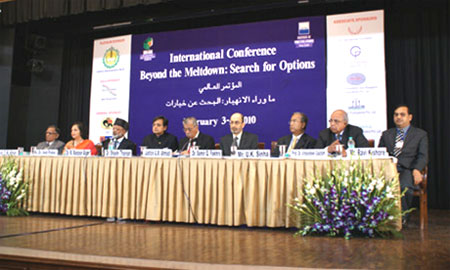
A view of Two-day International Conference on "Beyond the Meltdown: Search for Options" on February 3-4, 2010 at India Islamic Cultural Centre, New Delhi, Organised by Indo-Arab Economic Co-operation Forum, New Delhi & Institute of Objective Studies, New Delhi
L-R: Prof. Z.M. Khan, Ms. (Dr.) Swati Piramal, Dr. M. Manzoor Alam, Dr. Shashi Tharoor, Justice A.M. Ahmadi, Dr. Samir Q. Fakhro, Bahrain, Mr. U.K. Sinha, Prof. Dr. Vinaysheel Gautam, Mr. Ravi Kishore
He said: “Islamic banking is allowed in many parts of the world, but the Banking Regulation Act of India does not conform to Islamic banking because it allows banks to borrow from and deposit money with the RBI on interest. But we are in correspondence with the government on how our laws can be restructured or amended so that they are in conformity with Islamic banking”.
As far as the change in the law is concerned, I have met Mr Salman Khurshid, India’s Law Minister, several times in last few weeks to impress upon him the need to initiate the necessary measures. He has written to the Planning Commission of India and RBI as well as consulted with the top level of the federal government on the issue. Being among the four most powerful ministers in the cabinet of federal government, he has assured me of help, and has worked on that assurance.
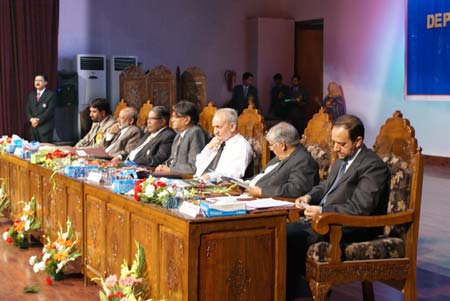
A view of Three-Day International Conference on "Interest-Free Institutional Mechanism (Banking, Finance and Insurance) for Promoting Investment" on June 3-5, 2011 at Kashmir University Organised by Institute of Objective Studies & Department of Business and Finance Studies, University of Kashmir
R-L: Prof. Syed Fayaz, Registrar of Kashmir University; Dr Ausaf Ahmad, former head special assignments IDB, Jeddah and finance secretary IOS; Prof Abdul Wahid Qureshi, Vice-chancellor of Central University Kashmir; Prof Talat Ahmad, Vice-chancellor, Kashmir University; Mr K Rehman Khan, Deputy Chairman Rajya Sabha; Dr M. Manzoor Alam, Chairman IOS; Professor Nazir A Nazir, Head of Department of Business and Financial Studies and Conference Director
The political establishment is today convinced that Islamic banking will allow inflow of billions of dollars into India and strengthen it. This will also help the country’s struggle to create a non-exploitative and equitable financial system in India.
God must be thanked and the struggle continued. It is a long story headed for a happy end.
Go Back